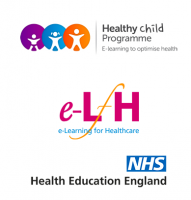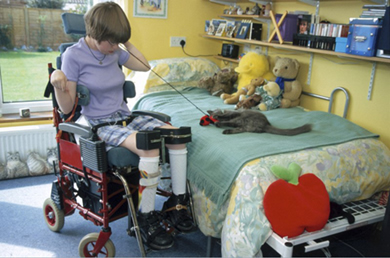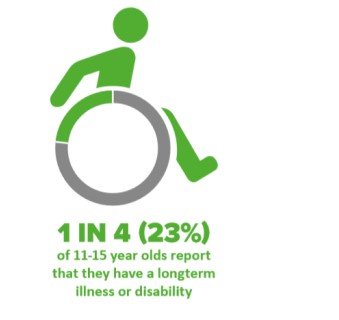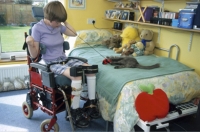The Experience of Long-term Condition and Disability during Adolescence



This session addresses the experience of having a long-term condition and disability during adolescence.
Learning Objectives
By the end of this session you will be able to:
- Demonstrate an understanding of the experience of having a long-term condition and disability by young people and their families
- Describe the interrelated impacts of having a long-term condition and disability on adolescent development
- Demonstrate an understanding of the impact of cognitive impairment during adolescence
There is increasing recognition of the prevalence of long-term conditions and disability during adolescence. 23% of 11-15 year olds report that they have a long-term illness or disability. This proportion is increasing with medical advances in therapeutic intervention and technology.
The great majority of these challenges for young people and their families are common across all long-term conditions and disabilities albeit with different potential consequences. Because of this we have taken a generic approach to the issues that young people and their families face in this session.
Before commencing this session you should:
- Complete the following AH session 02_001 Healthy Development in Adolescence (401-0004)
- Have awareness of the following exemplar long-term conditions: diabetes, cerebral palsy, Duchenne’s muscular dystrophy, juvenile idiopathic arthritis and inflammatory bowel disease e.g. Crohn's disease
Dr Janet E McDonagh is a Clinical Senior Lecturer in Paediatric and Adolescent Rheumatology at the Centre for Musculoskeletal Research at University of Manchester and Honorary Consultant paediatric and adolescent Rheumatologist at Royal Manchester Children’s Hospital.
Her main clinical and research interests are in adolescent health and transitional care. She has a particular interest in models of care for adolescents with chronic conditions that support young people’s emerging capacity for self-management, that ensure appropriate health risk assessment, support transition to adult health care, adherence to treatment guidelines and engagement with other health care services.
She is a member of the Barbara Ansell National Network for Adolescent Rheumatology, convenor of the Royal College of Paediatrics and Child Health Young Person’s Special Interest Group, co-chair of the Royal College of Physicians Young Adult and Adolescent strategy group and is on the advisory council of the Association for Young People’s Health.
Dr McDonagh is also involved in the development of training for health professionals in adolescent medicine including her role as a trainer in the European Teaching Effective Adolescent Care and Health initiative


Clinically active with interests in adolescent health as Adolescent lead for development of adolescent services in UHCW and as a Community Paediatrician caring for teenagers with severe learning disability in the community setting and working with colleagues in the Learning Disability setting to facilitate transition. Member of the RCPCH Young people’s Health Special Interest Group.
- Wound Care Education for the Health and Care Workf...
- Posted By eIntegrity Healthcare e-Learning
- Posted Date: 2024-12-23
- Location:Online
- This session builds on the Essentials of the Foot at Risk session to enable Tier 2 level knowledge and skills set out in The National Wound Care Core Capabilities Framework for England. It will introduce you to the 'at-risk foot' and explain how to asse
- Wound Care Education for the Health and Care Workf...
- Posted By eIntegrity Healthcare e-Learning
- Posted Date: 2024-12-23
- Location:Online
- This session aims to educate learners about how to use the Pressure Ulcer Risk Primary or Secondary Evaluation Tool (PURPOSE-T) (© Clinical Trials Research Unit, University of Leeds and Leeds Teaching Hospitals, NHS Trust, 2017) to carry out a pressure
- Wound Care Education for the Health and Care Workf...
- Posted By eIntegrity Healthcare e-Learning
- Posted Date: 2024-12-23
- Location:Online
- This session discusses the impact of nutrition and lifestyle behaviours on wound healing. It highlights common risk factors to healing and their influence on the intricate world of improving skin healing prospects whilst encouraging constructive patient c
- Wound Care Education for the Health and Care Workf...
- Posted By eIntegrity Healthcare e-Learning
- Posted Date: 2024-12-23
- Location:Online
- This session discusses the importance of comprehensive wound assessment. This session will be of benefit to health and care workers, practitioners and carers across any care setting.
- Wound Care Education for the Health and Care Workf...
- Posted By eIntegrity Healthcare e-Learning
- Posted Date: 2024-12-23
- Location:Online
- This session will introduce you to the foot, how to do a foot check and maintain foot hygiene and what to do if you identify any problems or changes. It will help you to build the skills needed to reduce the risk of a person developing foot problems.








